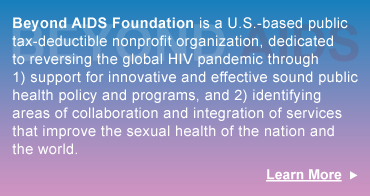LETTER TO CDC DIRECTOR ON SUPPORT FOR ROUTINE HIV TESTING; FURTHER MEASURES URGED
September 16, 2006
Julie Gerberding, MD, MPH
Director, Centers for Disease Control and Prevention
1600 Clifton Road
Atlanta, GA 30333
RE: SUPPORT FOR PROPOSED REVISED RECOMMENDATIONS FOR HIV TESTING OF ADULTS, ADOLESCENTS, AND PREGNANT WOMEN IN HEALTH CARE SETTINGS
Dear Dr. Gerberding:
On behalf of the Beyond AIDS Foundation, I am writing to strongly support the above draft recommendations for routine HIV testing in health care settings, and to urge the release of these recommendations on schedule. We also urge further actions described below.
The Beyond AIDS Foundation has long been in support of making HIV testing more routine and enthusiastically endorses this approach, which is long overdue. The new recommendations will bring CDC into synchrony with Prevention Recommendations 2, 3, and 4 of the Presidential Advisory Council on HIV/AIDS (PACHA) report of 12/05, “Achieving and HIV-Free Generation” (www.pacha.gov).
We hope that the release of the new recommendations will be the start of a new CDC activism in support of de-exceptionalizing HIV/AIDS, that will include testimony before Congress on the need for incentives in the Ryan White CARE Act renewal, and urging states to revise laws that currently require written consent and/or pretest counseling for HIV testing. We also trust that CDC will immediately act to assure that its grants will no longer require prevention counseling prior to HIV testing. Over recent years, we have learned that such requirements have served as an unintentional barrier to routine testing, and to the identification of an estimated quarter million infected Americans who are not aware of their HIV status.
Since 1987, I have personally been in charge of testing mentally disordered patients at the nation’s largest forensic mental institution. Until 2003, this program required both written consent (per California state law) and pre-test HIV counseling and education. Despite the best efforts of conscientious HIV counselors whom I trained, we were never able to get more than about 25% of admitted individuals through the process of HIV testing. When CDC guidelines on pretest counseling were liberalized in 2003, my hospital simplified its testing process and has been able to increase testing to as high as 40-50%. If we were able to dispense with written consent and go to opt-out verbal consent (which would require a change in California law), it would be possible to include HIV testing with admission test panels. I believe that we could then increase testing to over 90% of admitted patients.
However, our experience with the HIV name-based reporting issue leads Beyond AIDS to believe that the written consent requirements will likely only be changed by the Legislatures of California and other key states if there is a strong financial incentive, such as making elimination of special written consent requirements a condition for obtaining Ryan White CARE Act funding.
Beyond AIDS further recommends that CDC initiate additional steps to eliminate unique recommendations that have made HIV/AIDS an exception to public health. These include:
- Phasing down and eventually eliminating anonymous testing in favor of confidential, routine testing, as per PACHA Prevention Recommendation #6. CDC’s recommendation that all states offer anonymous testing sites is unscientific. It runs contrary to years of experience in states with no or minimal anonymous testing. These show that HIV testing is not impaired or deterred, and that bringing individuals who test positive into care and preventive interventions is enhanced by minimizing or eliminating anonymous testing.
- Linking HIV name-based reporting and surveillance with partner notification and prevention case management. CDC guidelines that keep these activities, and their funding streams, separate are illogical and serve as an impediment to comprehensive prevention strategy for HIV/AIDS.
Thank you for your leadership in gradually making the detection of HIV infection more of a routine part of health care. We urge that you accelerate these efforts, because lives are lost with every day of continued politically-generated "exceptionalism" in our approach to HIV/AIDS. As you know so well, we have no cure and no vaccine, and we cannot even effectively use treatment to help prevent transmission because of treatment guidelines that delay the use of antiretroviral drugs for years.
All we have to control the epidemic is proactive public health prevention, and political barriers have tied our hands behind our backs in using this one remaining tool. These barriers have resulted in obstruction of methods of disease control that we have effectively used for decades against tuberculosis and syphilis. We are counting on you to exert relentless pressure to eliminate those political barriers.
The current Congress is willing to support a change, as is the White House. This could change as soon as November, and this opportunity must be seized. Our victories this year in the battle for name-based reporting show that sound public health strategy can prevail. What is needed is the will among the top leaders of CDC to make prevention science predominant at last. It must triump over a political obstructionism that is increasingly outmoded and out of touch with the needs of the populations served by the very organizations that maintain such positions. We believe that you and the leadership of the Center for HIV, STD, and TB Prevention can summon the courage to bring this struggle to victory. Moreover, you must do this, or history will record a tragic lost opportunity to control one of the most deadly pandemics of human history.
Sincerely,
Ronald P. Hattis, MD, MPH (EIS 1959)
National Secretary, Beyond AIDS
888-BEY-AIDS
![]() Return to Archived Articles and Letters
Return to Archived Articles and Letters

